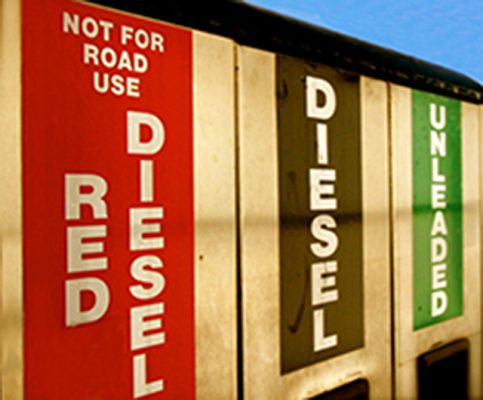Following confirmation that recreational sailors in England, Wales and Scotland can still use red diesel, what impact will that have on UK cruisers visiting the EU?
Following the announcement in the 2021 Budget that sailors can still use red diesel, what impact will that have on UK cruisers visiting the EU after Brexit?
Previously, some UK sailors have been fined by the Belgium authorities for having red diesel in their tanks.
The RYA’s Cruising Manager, Stuart Carruthers has this advice for UK sailors:
Now that HM Treasury has confirmed recreational boaters’ entitlement to use red diesel beyond April 2022, we are not prohibited from using marked ‘red’ diesel in the UK or in international waters.
However, you should be aware that it is possible that some EU Member States that previously took issue with the UK’s continued use of red diesel in private pleasure craft may continue to do so.
The UK is a contracting party to the 1990 Istanbul Convention.
The Istanbul Convention is intended to facilitate temporary admission into signatory states by harmonising Customs procedures and, in particular, it allows a means of transport (together with the fuel contained in the normal fuel tanks of that means of transport) to be imported into a signatory state temporarily without payment of import duties and taxes and without application of import prohibitions or restrictions.
Continues below…
Northern Ireland cruising: concerns over red diesel ban
From 30 June 2021, recreational boat owners in Northern Ireland have to fill up their vessels with white diesel. Currently…
Cruising after Brexit and sailing in Europe
As Europe begins to open up again for cruising, Lu Heikell looks at the implications of Brexit on UK sailors…
Boat owners need to carry VAT proof onboard post-Brexit
Skippers cruising to and from the UK need to prepare now for the ‘bureaucracy of sailing’ post-Brexit, the Cruising Association…
2021 Budget: Red diesel use by boaters confirmed
The Chancellor has confirmed that sailors and boaters will still be able to use red diesel to propel their vessels…
Fines for red diesel remain suspended in Belgium
The RYA said sailors can cruise Belgium "without fear of being fined" following confirmation that checks on British yachts remain…
Now that the UK is a third country, the 1990 Istanbul Convention should govern the movement of recreational vessels between the UK and the EU.
In order to rely on the Convention, a means of transport for private use must be registered in a territory other than that of temporary admission, in the name of a person established or resident in a territory other than that of temporary admission, and be imported and used by persons resident in such a territory.
For these purposes, the EU27 are considered to be a single territory.
This means that UK recreational boaters may now be able to temporarily import fuel, that is bought legally elsewhere, into the EU provided:
- the fuel is in the normal tanks of the vessel;
- the boat is registered in the UK or another non-EU state;
- the registered owner is established or resident in the UK or another non-EU state; and
- the boat is imported and used by persons resident in the UK or another non-EU state.
Although every individual member of the EU27 should recognise and apply the Istanbul Convention to such vessels, there is no guarantee that they all will (or will do so consistently).
The Istanbul Convention is similar to an EU Directive – it sets out the rules that the signatory states are supposed to implement but it does not give individuals any right of action should a particular signatory state decline to implement part or all of the Convention – only another signatory state has that capacity.
If you encounter any difficulties when using marked ‘red’ diesel abroad, the extent to which you will be able to rely on the Istanbul Convention will be determined by the national laws of the country in which the ‘offence’ has been committed.
When visiting an EU member state, the RYA recommends that recreational boaters with marked ‘red’ diesel purchased in the UK:
- Keep receipts for diesel purchased in the UK, to prove that it was bought in the UK, and request that your retailer marks them “duty paid”
- Log the date of refuelling and engine hours to reinforce these records; and
- Do not carry marked diesel anywhere other than in their craft’s main fuel storage tanks.
Enjoyed reading Brexit: Can I sail to the EU with red diesel in my tanks?
A subscription to Yachting Monthly magazine costs around 40% less than the cover price.
Print and digital editions are available through Magazines Direct – where you can also find the latest deals.
YM is packed with information to help you get the most from your time on the water.
- Take your seamanship to the next level with tips, advice and skills from our experts
- Impartial in-depth reviews of the latest yachts and equipment
- Cruising guides to help you reach those dream destinations
Follow us on Facebook, Twitter and Instagram.










